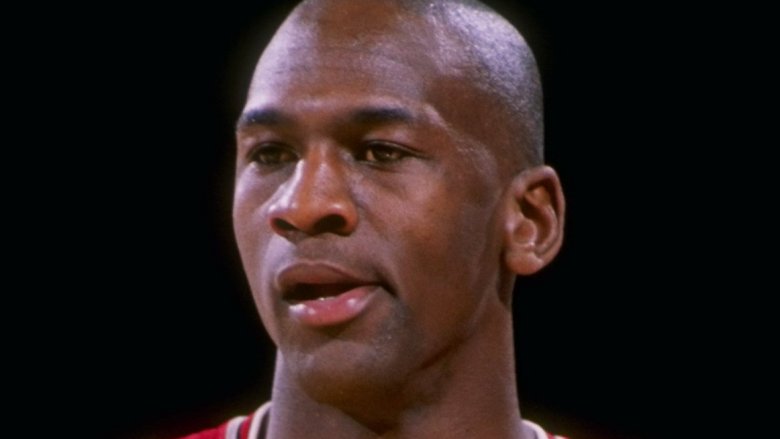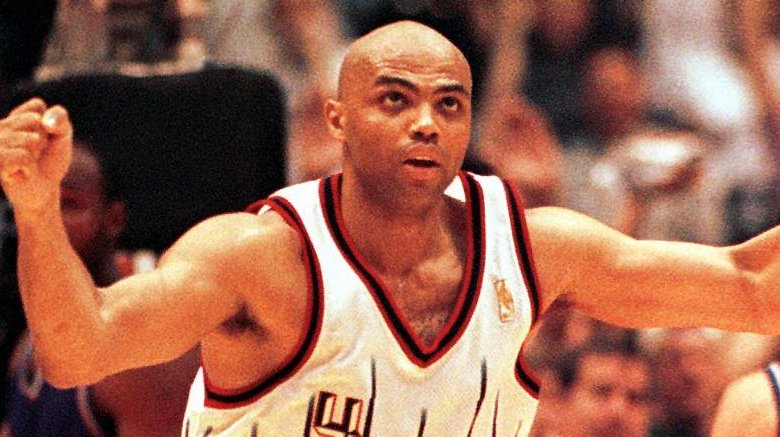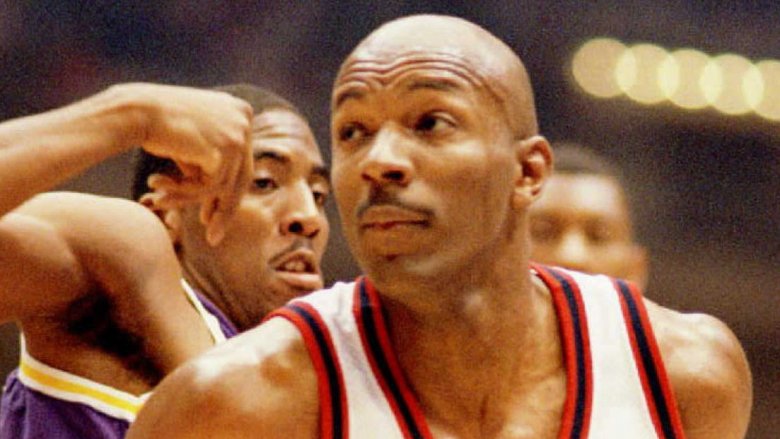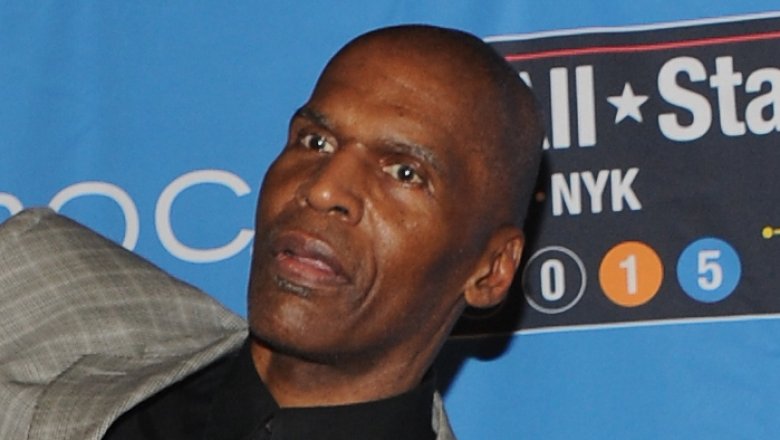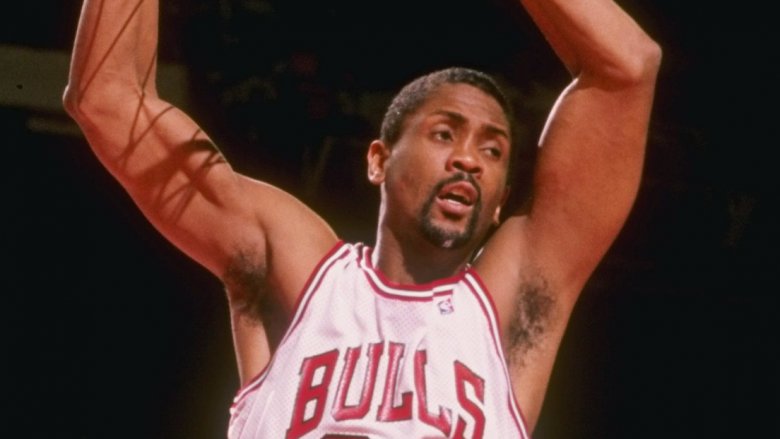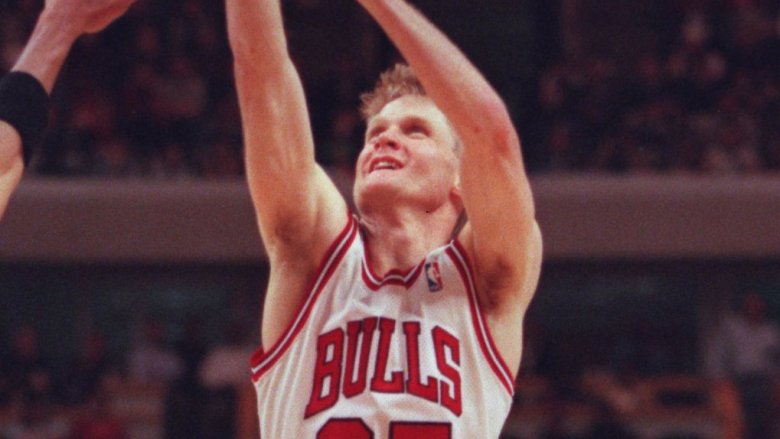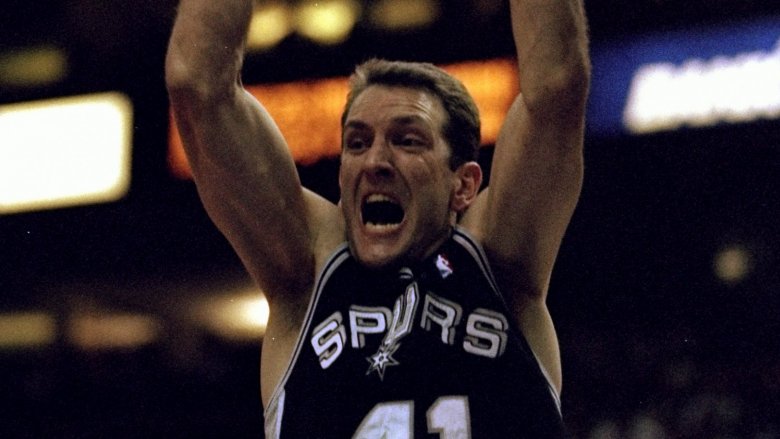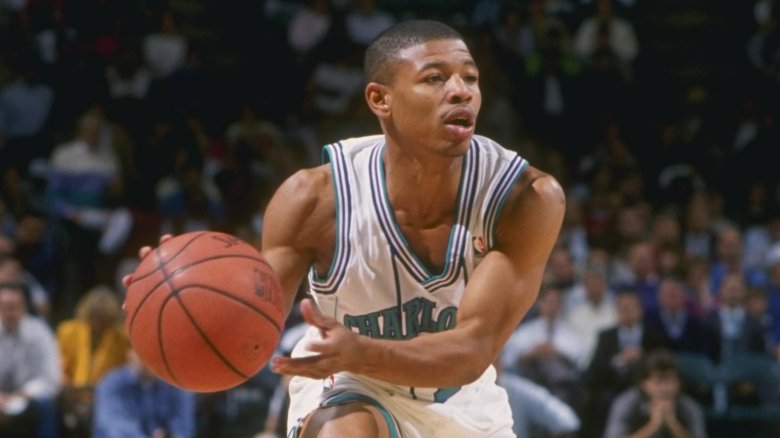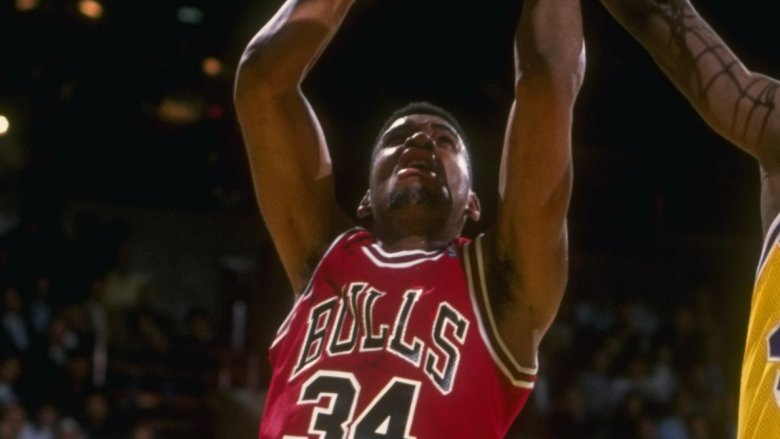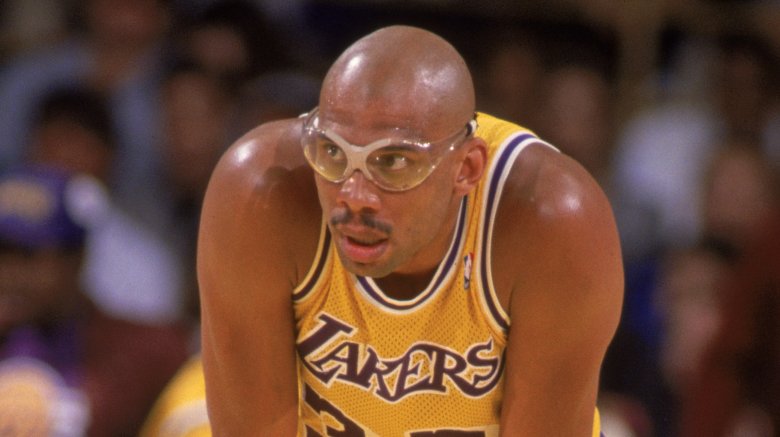Players Who Couldn't Stand Michael Jordan
Just about everybody was a Michael Jordan fan in the '80s and '90s. He elevated basketball like no one else, soaring through the air, hitting impossible jumpers, and leading his Chicago Bulls to six NBA championships. That's to say nothing of his 14 All-Star selections, 10 scoring titles, and five Most Valuable Player awards, among his myriad other accomplishments. Even people who weren't huge basketball fans liked Air Jordan because he was just so dang charismatic in his many off-the-court appearances, showing up in commercials for Nike shoes, sports drinks, and hot dogs, as well as the 1996 cinematic classic Space Jam. (Go Tune Squad!) Millions truly wanted to, as the ad said, "be like Mike," probably the greatest basketball player of all time and certainly the most famous one.
But the carefully crafted public image of Michael Jordan was not necessarily the "real" Michael Jordan. In the years since he left his playing days behind, stories have emerged of a man prone to a toxic competitive streak and trash-talking, name-calling, and general nastiness toward other players — both opponents and teammates. Here are some players who are decidedly not riding the Jordan train.
The Round Mound of Recourse
In the early '90s, fans of NBA superstars Michael Jordan and Charles Barkley were just as likely to glimpse those two at a fancy golf course as they were to see them on the court. Just before Game 4 of the 1993 NBA Finals between Jordan's Chicago Bulls and Barkley's Phoenix Suns, the luminaries (and supposed friends) met up for a few rounds of golf. According to a story attributed to late Bulls assistant coach Johnny Bach, Jordan then presented Barkley with a $20,000 diamond earring. Why? It wasn't generous or friendly, but a cold, strategic move. Jordan apparently figured the gesture would fill Barkley with so much warmth and affection for his "pal" that he'd back off on the court. Indeed, in Game 4, Jordan scored 55 points, seemingly untouched by the entire Suns roster, including Barkley.
Barkley later struck back, publicly and effectively. Barkley's a member of the raucous panel of TNT's Inside the NBA, and in 2012, he used that pulpit to criticize Michael Jordan for hiring too many unqualified cronies for jobs in the front office of the Charlotte Bobcats, for which he was the primary owner. As a result of those comments (and apparently not his own nasty actions), Barkley says Jordan ended the friendship. "We don't have a relationship," Barkley said.
Clyde the Glide couldn't let it slide with Michael Jordan
The appropriately nicknamed Dream Team cakewalked to a gold medal in basketball at the 1992 Summer Olympics. Its roster was stacked with so much talent — Karl Malone, Larry Bird, Magic Johnson, and Michael Jordan, to name a few — that Hall of Famers like Chris Mullin and Scottie Pippen wound up as benchwarmers. Not every NBA star of the early '90s could make it onto the Dream Team, of course, but there was one particularly conspicuous absence: Isiah Thomas, Detroit Pistons star and key member of the Bad Boys teams that brought back-to-back titles to the Motor City. He was kept off the team by Michael Jordan, who possessed both the clout and sour grapes (over the Bulls frequent playoff losses to the Pistons) to do so.
In sportswriter Jack McCallum's book Dream Team, Dream Teamer Clyde Drexler called out Jordan. "I don't think Jordan wanted to play with Isiah," Drexler said. "Two championships in a row, always an All-Star. And Isiah can't make it? I didn't like that. It's not the players' choice. It's who's supposed to be there. If you don't like me, I don't give a f*ck. We're competitors. You're not supposed to like me. But when one player has the ability to leave another player off, we've lost control of the system."
Michael Jordan's a jerk? Parish the thought
Hall of Famer Robert Parish never seemed to have beef with anybody, or if he did, he kept it to himself. After all, this was a player so serious and stoic that a teammate nicknamed him "The Chief" after the similarly quiet character from One Flew Over the Cuckoo's Nest. So if a player irked him, he must have really been irked.
After a long and legendary stint as one of the "Big Three" for the Boston Celtics in the '80s alongside fellow legends Larry Bird and Kevin McHale, Parish finished his career in 1996-97 with the Chicago Bulls. Pro: The team won an NBA championship that year. Con: Parish had to play with Michael Jordan. In 2012, Parish told ESPN that after he messed up a play during one of his first practices with the Bulls, Jordan got up in his face and sassed him hard. Parish wouldn't hear it. "I told him, 'I'm not as enamored with you as these other guys. I've got some rings, too," Parish said. "At that point he told me, 'I'm going to kick your ass.'" Parish called Jordan's bluff. "I took one step closer and said, 'No, you really aren't.'" And he never did.
Bill Cartwright? More like Bill Cart-wronged-by-Michael Jordan
As much of a jerk as it sounds like Michael Jordan could be, he was at least loyal to those who managed to please him. Charles Oakley became one of Jordan's closest friends and allies in the NBA after both players joined the Bulls in the mid-1980s. In the end, Jordan and Oakley didn't get to be BBFFs (that's "basketball best friends forever"), playing together for only three seasons before the Bulls traded Oakley to the New York Knicks for center Bill Cartwright.
Like a divorce-stung kid, Jordan acted out against Cartwright like this new teammate was mom's new boyfriend. According to David Halberstam's Playing for Keeps: Michael Jordan and the World He Made, Jordan attempted to sabotage Cartwright, intentionally sending him bad passes during practices so the new guy would look clumsy and untalented. Even worse, Jordan gave Cartwright the not-at-all clever nickname "Medical Bill" because he had dared to get injured in the past.
However, Jordan eventually apologized, and in print no less. In his coffee table book For the Love of the Game: My Story, Jordan wrote, "I was wrong about the Charles Oakley-Bill Cartwright trade in 1988. I loved having Charles on the team, but Bill made the difference." (And how: Michael Jordan didn't win any titles alongside Oakley, but he won three with Cartwright on the court.)
A violent o-Kerr-unce with Michael Jordan
Today, Steve Kerr is one of the best coaches in the NBA, guiding the Golden State Warriors to three NBA titles. Kerr is more famous as a coach than as a player, but he does have three rings he earned as backup guard for the Chicago Bulls in the '90s, plus two rings with the San Antonio Spurs. Perhaps the toughest opponent he ever faced: teammate Michael Jordan.
After his nearly two-year NBA leave of absence to play baseball, Jordan returned to the Bulls' 1995 training camp, no less driven than he'd been in the past. "Camp was insane, how competitive and intense it was," Kerr told Vice Sports, and he felt Jordan's wrath when he guarded him during a scrimmage. "Michael was just being incredibly physical," Kerr said, but then things got "a little out of control" when, after coach Phil Jackson stepped out for a minute, Jordan got more aggressive and launched into the trash talk. At some point, Jordan's unrelenting smart mouth and hard fouls became too much for Kerr to bear. "I started talking back," Kerr said. "Then I started fouling him." After trading elbows, Jordan exploded. "I was like the kid in Jurassic Park who got attacked by the velociraptor," Kerr joked. Fists were raised, and Kerr got himself a black eye. Michael Jordan apologized via answering machine message, while Kerr said things were fine from then on. "Getting into that fight, I think I proved that I was tough, that I would stand up to him and I think he respected that." It's nice they've seemingly made up, at least.
The team was not there for Will Perdue's sake
Michael Jordan apparently had a nasty habit of roughing up the bench players on his team. His Chicago Bulls "golden age" teammate Horace Grant told a New York radio station in 2015 that Jordan got extra violent with Will Perdue during a team scrimmage back in the day.
"I hate to tell the story, but Will and I are still good friends," Grant said before very much relishing in telling the story. "We run this play and Will set an illegal pick on M.J., and M.J. said, 'Will, don't do that again.'" Crisis averted ... momentarily. Coach Phil Jackson ordered the squad to try the play again. "So naturally we run it two more times," Grant said, one of which included another illegal screen from Perdue. But that one didn't end with a polite warning from Jordan. "M.J. walks up to Will — boom. Lit him up," Grant said, meaning that Michael Jordan socked Perdue right in the face. He and other players held back Perdue from escalating the situation and attacking the team's star player. The following day, Grant says, Perdue boarded the team plane with a "huge shiner."
Did Michael Jordan ruin Muggsy Bogues?
After his two-year sabbatical/mid-life crisis in which he fruitlessly pursued a career in professional baseball, Michael Jordan returned to the NBA in 1995 looking to make up for lost time ... and looking to prove something. Jordan seemingly directed a lot of that psychic energy at one player in particular during the Bulls' first-round playoff series that year against the Charlotte Hornets.
Late in Game 4 with the score tied, dynamic guard Tyrone "Muggsy" Bogues had possession of the ball. For years, Bogues had been one of the NBA's most exciting players to watch, in part because at 5'3" he was one of the smallest guys to ever make it into the league's land of giants, but he was so quick and agile that size didn't matter. But then Jordan ruined everything. Bogues claims that while Jordan was guarding him, His Airness quipped, "Shoot it, you f*cking [nasty word for short person]." Bogues, unnerved, missed that shot, and the Hornets lost. Bogues later told Bulls assistant coach Johnny Bach (according to a widely circulated collection of Bach's stories) that Michael Jordan's trash talk permanently ruined his game, and that his stats faltered as a result.
It's not so good to be the King
While never a huge star, Stacey King played eight seasons in the NBA as a center and forward who could contribute a handful of crucial rebounds and points most nights. He spent the first half of his career in Chicago, where he was part of a team that won three straight NBA titles in the early '90s. However, his teammates were not kind. He arrived at preseason training camp in 1990 overweight, prompting other Bulls to give him the nickname "Doughboy." According to Sam Smith's behind-the-Bulls book The Jordan Rules, Michael Jordan led the anti-King charge. After King got a chance to get off the bench, he landed just one defensive rebound in three starts. Within earshot of King, Jordan cruelly mocked him — and his weight — to teammates: "You ever hear of a guy, 6'11" maybe and 260 pounds, a guy big and fat like that and he can't get but two rebounds, if that many." Michael Jordan again called King a "big, fat guy" and quipped that he should play not power forward but "powerless forward." After that, according to Smith, King got angry. "I'm gonna kick his ass one day," King said. "You wait. My time will come and I'll get him. I'll shut his mouth." He didn't.
Michael Jordan wasn't a dream for Kareem
Most of the players here endured first-hand Michael Jordan's cold if not cruel competitive nature run amok. Kareem Abdul-Jabbar, one of a handful of guys who could challenge Jordan for the title of "greatest basketball player of all time" wrapped up his career around the time Jordan's was just beginning, and their teams didn't face each other that often. But he's still got a reason for his distaste of Air Jordan, specifically Jordan's Air Jordans.
In 2015, Abdul-Jabbar explained at a National Public Radio event that he was disappointed that the categorically apolitical Michael Jordan didn't only blow his chance to affect real change as a highly influential public figure, but that he actively chose making money over making a difference. "You can't be afraid of losing shoe sales if you're worried about your civil and human rights. He took commerce over conscience," Jabbar said. "It's unfortunate for him, but he's gotta live with it."
